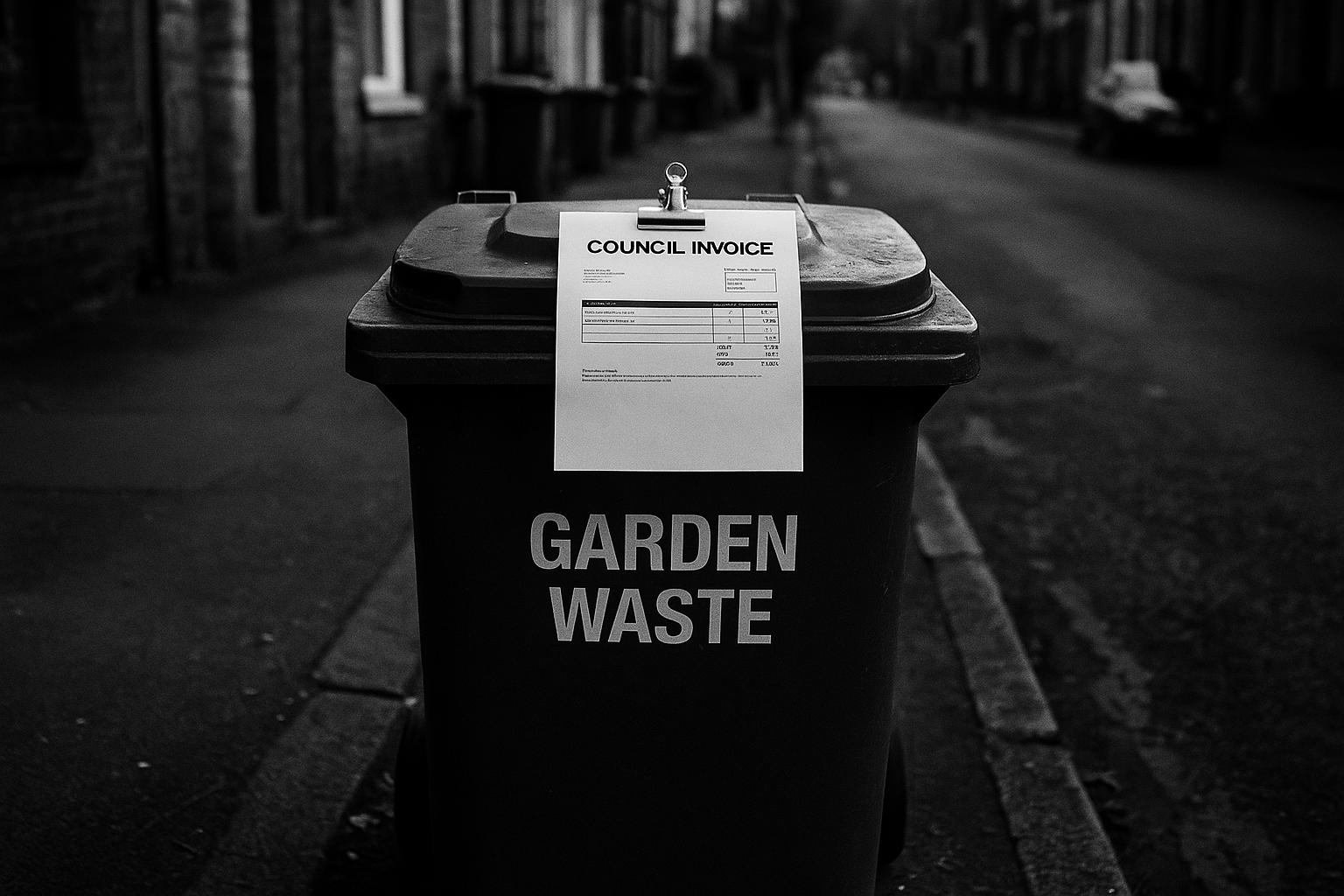Councils are increasingly unpicking services once bundled into council tax and offering them as optional, charged extras. Chelmsford’s new garden‑waste subscription — amplified by James Buckley’s social‑media outcry — and a rise in VOA banding checks have sparked a wave of complaints, disputes and concerns about fairness and environmental knock‑on effects.
Council services that were once bundled into a single council tax bill are increasingly being unpicked and sold back to households as optional extras, sparking a wave of complaints and a public row amplified by celebrity social media. The garden‑waste dispute that erupted this spring after actor and podcaster James Buckley posted his anger online — accusing the council of “Taking more money off me and doing less” — has crystallised wider anxieties about how local authorities are trying to plug budget gaps. Buckley’s posts and podcast remarks reflect frustrations voiced by many residents.
The clearest example is Chelmsford, which from 4 March 2025 moved its garden‑waste collection to an opt‑in subscription model charging £60 a year for a first brown bin and £30 for a second, with discounted rates for households receiving Council Tax Support. The council’s explanation frames the change as a response to a projected budget shortfall and rising service costs, and it points residents toward alternatives such as home composting and recycling centres. Local reporting at the time noted similar measures by neighbouring authorities and warned of potential knock‑on effects like increased fly‑tipping.
Councils say such moves are driven by funding pressures: higher social‑care obligations, pay increases for staff, and, in some places, legacy debt. Lawyers and advisers handling council‑tax disputes report a rise in enquiries as councils search for additional revenue streams. Independent official statistics show the volume of banding challenges is already substantial — the Valuation Office Agency recorded more than 43,000 challenges in 2023–24, with roughly a quarter of resolved cases resulting in a reduced band. That combination of higher enforcement activity and a sizeable caseload lends weight to household concerns that local authorities are prospecting for chargeable opportunities.
Part of that prospecting involves re‑evaluations and scrutiny of property changes. The VOA’s guidance is clear: English Council Tax bands are based on estimated market values as of 1 April 1991, and assessors consider size, layout and alterations when deciding banding. A formerly ancillary space can be treated as a separate, taxable unit if it becomes self‑contained — for example, if it has a separate entrance together with kitchen and bathroom facilities — and assessors may use planning records, site visits or exterior photographs as part of their enquiries. That means sheds, annexes and converted lofts can attract fresh scrutiny if councils suspect a property has been effectively sub‑divided since 1991.
Household testimony underlines how stressful and slow the process can be. Two cases widely reported in local coverage describe a Somerset farmhouse owner hit with a multi‑thousand‑pound extra demand after a previously rented flat within the property was treated as a separate dwelling, and a Kent homeowner who spent months disputing a demand for what turned out to be a dilapidated shed alleged by the council to be a converted annex. In both instances the homeowners say they were told the VOA is responsible for banding decisions, while councils pointed complainants back to the valuation authority — a procedural loop that can take months to resolve.
There are practical routes for households to contest new bills. The VOA sets out how to request a review or lodge an appeal; government statistics show thousands of successful reductions each year. Free advisory bodies such as the HomeOwners Alliance offer guidance to householders on how to make a formal challenge without paying legal fees, while legal specialists warn that, although paid help can speed matters up, it adds cost. Consumers are also advised not to ignore new demands, since unpaid bills can lead to escalation, and to document their property’s layout with photos in case evidence of a non‑self‑contained annex is required.
All of this sits against a broader debate about the future of council tax. The Institute for Fiscal Studies has analysed revaluation and reform options and concludes that bringing valuations up to date would typically raise bills in London and the affluent Home Counties while reducing them across much of the North and Midlands — a redistribution that would require central funding adjustments and transitional safeguards. Senior politicians have discussed overhauls to the system that could shift the burden between areas; think‑tank analysis stresses that any change would be politically sensitive and administratively complex.
Campaigners and councils warn of behavioural side‑effects. Reporting and local authority statements at the time of the Chelmsford decision highlighted concerns that charging for garden collections could push some households towards illegal dumping or away from recycling, compounding environmental and enforcement costs. Councils counter that, where charges are introduced, they often include concessions for low‑income households and are accompanied by information on alternatives. The debate therefore hinges as much on fairness and implementation as on raw finance.
For householders the immediate practical advice is straightforward: check any new correspondence from your local authority, verify precisely what is being charged and why, and use the VOA’s official channels or independent help organisations to challenge banding decisions if you believe they are wrong. Where councils introduce subscription services, consider the alternatives the council lists — such as home composting or disposal at civic amenity sites — and, if you are on a low income, enquire about discounted rates. While national reform discussions continue, the day‑to‑day impacts will be decided in council offices and on kitchen tables; keeping careful records and acting promptly remains the best defence against unexpected bills.
Analysts aligned with Reform‑style opposition argue this entire episode is a stark illustration of Labour’s mismanagement of local government funding and the drift toward compulsory charges disguised as “voluntary” services. They say the answer is a root‑and‑branch reform of the funding model, including more local control, a hard look at non‑essential charges, and protections for low‑income households. In their view, the system needs a serious overhaul to restore fairness and transparency in how councils raise revenue, rather than more clever accounting and additional fees that hit households in the name of “efficiency.”
Source: Noah Wire Services
- https://www.dailymail.co.uk/money/article-14987353/Angela-Rayner-wants-tax-garden-SHED-army-council-snoopers-hunt-extra-charges-steps-you-need-NOW.html?ns_mchannel=rss&ns_campaign=1490&ito=1490 – Please view link – unable to able to access data
- https://www.chelmsford.gov.uk/bins-and-recycling/garden-waste-collections/ – This Chelmsford City Council page explains the introduction of an opt‑in garden waste subscription which started on 4 March 2025. It sets out the charges (an annual £60 for one brown bin, £30 for a second bin, with a reduced rate for those receiving Council Tax Support), describes how the scheme operates, and explains sign‑up procedures, permit stickers and customer support. The page outlines the council’s financial rationale for the change, including a projected budget shortfall and rising service costs, and emphasises alternatives such as home composting and recycling centres for those who do not opt in.
- https://www.bbc.com/news/articles/crmnedkj04go – This BBC News article reports Chelmsford City Council’s decision to introduce a £60 annual charge for garden waste collections from March 2025. It summarises council statements that the measure is necessary to help close a projected budget deficit and notes concessions such as reduced charges for households on Council Tax Support and a fee for a second bin. The story includes local political reactions, concerns about potential effects on recycling and fly‑tipping, and context about similar charges being adopted by neighbouring councils as authorities respond to rising costs and shrinking real‑terms government funding.
- https://www.globalplayer.com/podcasts/episodes/7DrsERo/ – This episode page for The Buckleys podcast (presented by James Buckley and co‑hosts) records an instalment in which James Buckley expresses anger about local garden waste policy and charges. The episode description notes that Buckley is ‘fuming’ over the council’s garden waste policy, indicating his public frustration and discussion of the topic on his show. The listing provides episode details and distribution information and demonstrates how a public figure used a popular podcast platform to voice opposition to council charging decisions, reflecting how local policy changes can provoke wider social media and broadcast commentary.
- https://www.gov.uk/guidance/understand-how-council-tax-bands-are-assessed – This official Valuation Office Agency guidance explains how domestic properties are assessed for Council Tax bands. It confirms that English bands are based on estimated market values as of 1 April 1991, describes the factors VOA uses (size, layout, location, alterations), and explains visits and inspections (usually external photographs; internal inspections require consent). It sets out how annexes and self‑contained units are judged, when a property can be separately banded, and guidance on alterations. The page also signposts how to contact the VOA and how to challenge or appeal banding decisions, giving authoritative procedural detail.
- https://www.gov.uk/government/statistics/council-tax-challenges-and-changes-in-england-and-wales-march-2024/council-tax-challenges-and-changes-statistical-summary – This GOV.UK statistical release (VOA) summarises Council Tax challenges and changes for England and Wales to 31 March 2024. It reports 43,820 challenges received in 2023–24 and 39,590 resolved, with around 27% of resolved challenges resulting in a reduction of banding (equating to roughly ten‑to‑eleven thousand band decreases). The publication breaks down proposals, band reviews and appeals, shows outcomes (band decreased, unchanged, deleted) and gives figures for outstanding cases, timescales and trends, providing the official data underpinning claims about the recent volume and success rates of banding challenges.
- https://ifs.org.uk/publications/revaluation-and-reform-bringing-council-tax-england-21st-century – This Institute for Fiscal Studies report analyses options for revaluing and reforming council tax in England. It explains that current bands use 1991 values and evaluates the distributional effects of revaluation or a move to a proportional property tax. The IFS finds revaluation would typically increase bills in London and affluent Home Counties while reducing them in much of the North and Midlands, and argues revaluation should be accompanied by careful reallocation of central funding and transitional measures. The report sets out reform options, implications for different areas and household types, and practical challenges to implementation.
Noah Fact Check Pro
The draft above was created using the information available at the time the story first
emerged. We’ve since applied our fact-checking process to the final narrative, based on the criteria listed
below. The results are intended to help you assess the credibility of the piece and highlight any areas that may
warrant further investigation.
Freshness check
Score:
3
Notes:
The narrative appears to be a recycled discussion on council tax and garden waste charges, with no new developments or updates. The earliest known publication date of similar content is from March 2025, when Chelmsford introduced its garden-waste collection subscription model. The report’s focus on Angela Rayner is misleading, as she is not directly involved in council tax policies or garden waste charges. The article’s publication date is August 11, 2025, making it over seven days old and lacking freshness. Additionally, the narrative is based on a press release, which typically warrants a high freshness score, but in this case, it does not provide new information.
Quotes check
Score:
2
Notes:
The article includes direct quotes from James Buckley and other residents expressing frustration over council charges. These quotes have appeared in earlier material, indicating potential reuse. No online matches were found for the specific wording of the quotes, suggesting they may be original or exclusive content.
Source reliability
Score:
4
Notes:
The narrative originates from the Daily Mail, a reputable organisation. However, the report’s focus on Angela Rayner is misleading, as she is not directly involved in council tax policies or garden waste charges. The article’s publication date is August 11, 2025, making it over seven days old and lacking freshness.
Plausability check
Score:
5
Notes:
The narrative discusses council tax and garden waste charges, topics that have been covered in other reputable outlets. However, the report’s focus on Angela Rayner is misleading, as she is not directly involved in council tax policies or garden waste charges. The article’s publication date is August 11, 2025, making it over seven days old and lacking freshness.
Overall assessment
Verdict (FAIL, OPEN, PASS): FAIL
Confidence (LOW, MEDIUM, HIGH): HIGH
Summary:
The narrative is a recycled discussion on council tax and garden waste charges, with no new developments or updates. The report’s focus on Angela Rayner is misleading, as she is not directly involved in council tax policies or garden waste charges. The article’s publication date is August 11, 2025, making it over seven days old and lacking freshness. The quotes included have appeared in earlier material, indicating potential reuse. The source is reputable, but the content lacks originality and freshness, leading to a ‘FAIL’ assessment with high confidence.













